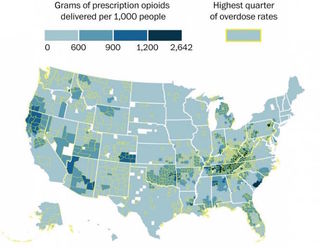Addiction
America’s Opioid Epidemic
Court-released documents show drug makers blocked efforts to curb prescribing.
Posted October 28, 2016

Roughly 78 Americans die each day from the opioid epidemic that has ravaged states from Florida to Maine. The Appalachian region—West Virginia in particular—is among the hardest hit and has suffered the highest number of casualties. In August this year, the city of Huntington, WV, experienced 26 overdoses in just a few hours. Every year, opioid addiction kills almost 30,000 Americans nationwide.
Given the scale of the crisis, the health and medicine newspaper STAT, published by Boston Globe Media, deserves praise for its outstanding investigative reports on the reason opioid addiction has flared disproportionately in the region. Earlier this year, the publication’s tireless efforts at unlocking court-sealed documents in Kentucky helped bring to light how Connecticut-based Purdue Pharma and Abbott Laboratories, its marketing partner, aggressively promoted the painkiller OxyContin, whose active ingredient oxycodone is both highly addictive and widely held to be responsible for the fatalities.
The investigation included 17 million pages of documents produced during litigation that the state of Kentucky brought against the drug maker. As part of the $24 million settlement, STAT reported at the time, Kentucky's attorney general's office "destroyed its copies of documents" that Purdue had been required to make available, though other key papers—including the deposition of a company board member—were filed under seal elsewhere and subsequently retrieved. The documents help explain why fatal overdoses from the prescription painkiller quadrupled between 1999 and 2013, when more than 16,000 Americans overdosed on oxycodone.
Two days ago, in an even more dramatic and significant turn, STAT reported on the role that Purdue Pharma and Abbott Laboratories played in fueling the crisis in neighboring West Virginia, including a system-wide effort to block state medical agencies wanting to restrict Oxycontin prescriptions to those genuinely in need. The state's decision to require prior authorization for patients had been shown to reduce opioid abuse, though both drug makers dismissed the initiative as generating merely unwanted paperwork.
The documents that STAT succeeded in unsealing show in a clear, unflattering light that Abbott and Purdue actively misled prescribers about the strength and safety of the painkiller. To undermine the policy of requiring prior authorization, they offered lucrative rebates to middlemen such as Merck Medco and other pharmacy benefits managers, on condition that they eased availability of the drug and lowered co-pays. The records were part of a case brought by the state of West Virginia against both drug makers alleging inappropriate and illegal marketing of the drug as a cause of widespread addiction. As David Armstrong notes, “The case was settled in 2004 when Purdue agreed to pay $10 million to the state. Neither company admitted any wrongdoing.” Until recently, the documents had been kept under seal at the McDowell County Courthouse in Welch, WV.
The “rebates” were part of an elaborate system Purdue Pharma developed in other states also, STAT has since determined, including a lottery system aimed at boosting prescribing that included $20,000 in prizes. Other incentives included the strategy “Dine and Dash”—providing busy doctors with takeout meals—and offers of up to 250 “TravPass dollars.” One harried doctor with a known weakness for junk food was larded with doughnuts arranged to spell “OxyContin.” Apparently, that was enough to boost his prescribing.
Other leading prescribers were given flattering monikers such as “King of Pain” and “Wizard of OxyContin” at the “Royal Court of OxyContin.” The drug maker, staff admitted, was intent on creating a “Crusade” to turn its painkiller into a billion-dollar blockbuster.
One reason the documents are so troubling is that, in public at least, the drug maker was carefully assuring authorities that it was working with state authorities to curb abuse of OxyContin. Behind the scenes, however, as one Purdue official openly acknowledged, the drug maker was “working with Medco (PBM) to try to make parameters [for prescribing] less stringent.”
Representatives for Purdue Pharma said the company would make no comment about the investigative reports. In response to my follow-up request, however, Robert Josephson, executive director of communications at Purdue emailed: "We contract with PBMs [Pharmacy Benefit Managers] to ensure legitimate patients have access to the medicines prescribed by their doctors. This practice is the industry standard, whether the medicines are for pain, cancer or diabetes. It is inaccurate and irresponsible to claim that PBM contracts undermine public health."
Meanwhile, in McDowell County, West Virginia, where the court records are now unsealed and the numbers of people afflicted still rampant, the local sheriff plans to file a new lawsuit against the drug makers.
christopherlane.org Follow me on Twitter @christophlane


